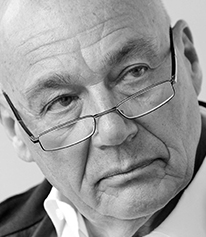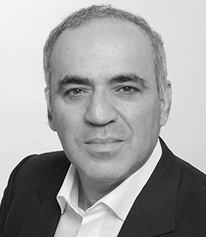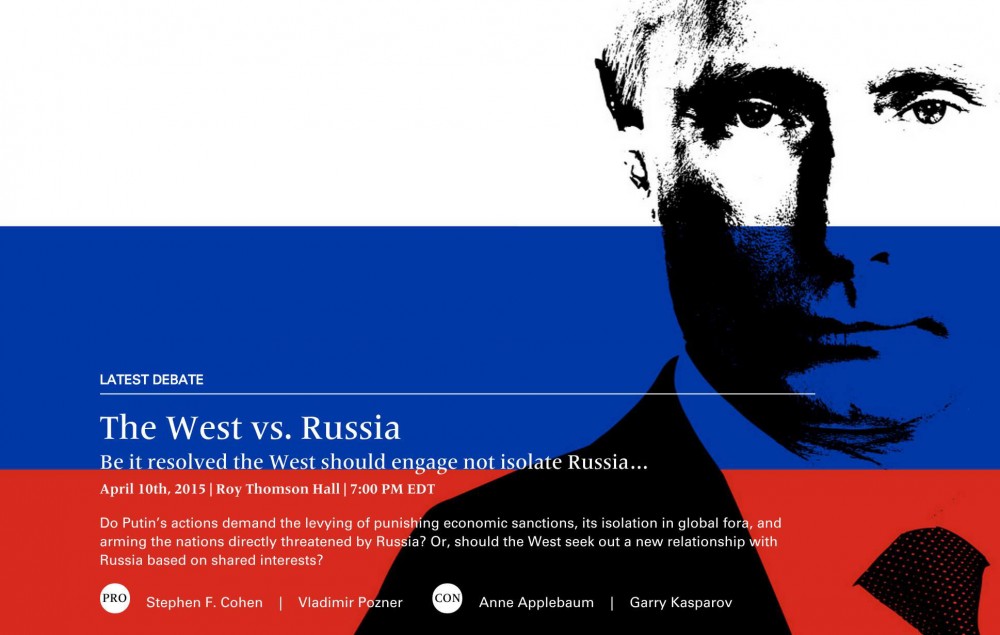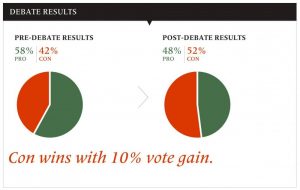Do Putin’s actions demand the levying of punishing economic sanctions, its isolation in global fora, and arming the nations directly threatened by Russia? Or, should the West seek out a new relationship with Russia based on shared interests? How should the West deal with Putin’s Russia? For the US and some European powers the answer is obvious: isolate Russia with punishing economic sanctions, remove it from global institutions such as the G8, and arm the nations directly threatened by Putin. In short, return to the Cold War doctrine that froze Soviet aggression in Europe and helped bring about the collapse of communist Russia. Others argue that such a policy of isolation is a dead-end. Putin’s Russia has legitimate grievances against Western and NATO powers meddling in its sphere of influence. Instead of further antagonizing Putin and risking a dangerous escalation of the current conflict, the US and Europe should seek common cause with Russia to address shared threats, from the Middle East to Asia to combatting terrorism and build a new relationship based on these shared interests.
This was the topic of the recent Munk Debate held in Toronto, Canada, on April 10, 2015. The participants speaking in favor of the resolution were Vladimir Pozner [also spelled Posner - Ed.], Russian journalist, media personality and a senior Russian propagandist in the West who started his career in the Soviet propaganda machine, and Stephen Cohen, professor of Soviet, post-Soviet Russian history, and a “Putin-versteher.” Speaking against the resolution were Garry Kasparov, chess champion and former candidate for President of Russia, and Anne Applebaum, columnist and author on Russia and Eastern Europe.
This debate was important on a number of levels. First it was broadcast live on the internet, so people everywhere could follow along in real time, as well as participate online, via twitter hashtag #munkdebate. In addition, viewers were virtual participants in a rolling poll gauging the team’ performance during the debate, including casting a vote on debate winners afterwards. Second, it was a unique opportunity, after many months of heightened media attention though without much scrutiny to Russia because of Putin’s actions in Ukraine, for a more in-depth conversation of the complicated issues involved in the West’s deteriorating relationship with Russia. Third, although all of the participants have quite openly and vocally expressed their views in the media, this was a rare opportunity to see them on the same stage, not only stating their case, but responding to each other.
[hr]
VLADIMIR POZNER
: Russia today is the direct result of non-engagement by the West, whose policy has been to humble a nation of proud people.

Pro
Vladimir Pozner
“For the average Russian, who is a very proud person with a sense of history and a belief that his is a great country, Putin has given him back his sense of pride - you cannot ignore us any more, the way you did when Yeltsin was in power and Russia was on its knees.”
Although beginning by stating that he wasn’t there to present Russia’s case, Vladimir Pozner did just that. His remarks were less argument for engagement than a recitation of the historical, political, and importantly psychological dimensions underlying Russia’s actions today. Since the reality is that most people outside Russia are baffled by Putin and don’t understand what could be driving his shocking recent conduct and statements, Pozner’s perspective was an important addition to the conversation.
Right off the bat, Pozner spoke of Russia as a nation not to be ignored through isolation, and, in fact, a nation too important not to be reckoned with. “Isolation of any country is counterproductive and dangerous, especially when the country is as big, as wealthy, as powerful and as unpredictable as Russia.” Then he launched into a dramatic history lesson on the 20th century through Russian eyes:
"When the Russian Empire crumbled in 1917 and the Bolsheviks came to power, the West refused to recognize first, Soviet Russia and then the Soviet Union. Isolation and non-engagement was the word of the day, and so for a decade or so the country was cast by Western media as an evil power and left to stew in its own juices. The prediction was that it would inevitably fall apart. That it was economically dead in the water. that its people would rise up and destroy the regime. As we know, none of this happened. In 1929 the West was hit by the worst economic crisis in its history. Meanwhile the USSR announced its first 5-year plan of economic development. Over those years of nonrecognition and isolation, the Soviet Union leadership headed by Stalin had been allowed to conduct a massive bloodbath in the country. It had physically wiped out all political opposition. It had destroyed millions and millions of peasants who had refused to adhere to the collective farm system. It had starved to death millions of Ukrainian farmers who would not bow to the draconian demands for wheat and flour. It was in the process of annihilating Russia’s most precious human resource, the intelligentsia. It is in the process of creating a new human entity, the so-called “homos Sovieticus.” The great terror of 1937-38 lay just ahead. But nonrecognition, non-engagement, isolation, non-interference, if you will, on the West’s part, the absence of any united outcry, all this played no small role in allowing the Soviet system to evolve the way it did."
Yes, Pozner was making the case that the West shares the blame for the horrors of Russia’s Soviet history, including Stalin’s deadly collectivization and the intelligentsia purges. Moreover, he suggests that the bloodbath of the Stalin years could have been prevented had the West been more engaged with the Soviet Union.
Pozner went further, in time and in blame. It was the West’s refusal to engage the Soviet Union in an alliance against Hitler in the late 1930s that led to Stalin’s alliance with Hitler in the infamous Molotov-Ribbentrop Pact with its secret protocol selling off the Baltic states and part of Poland to the Soviet Union. Of course he also noted the Soviet Union was responsible for breaking the back of Nazi Germany (citing both Churchill and FDR). And despite the fact that the USSR went on to occupy Eastern and Central Europe, it became a military superpower, but a responsible one. “We should thank our lucky stars that World War III never happened, thanks to M-A-D, mutually assured destruction."
In his brief time, Pozner articulated the deep feelings of resentment, defensiveness and injustice that Russians harbor against the West. Imagine, a great nation like Russia, who sacrificed so much to save the West, who not only isn't grateful but doesn't even give the respect and credit due. In this view, Russia is the Rodney Dangerfield, if you will, of geopolitics. No matter what great things it does, it just can’t get any respect from Western powers.
We've heard these sentiments in Putin’s speeches. [here, here and here.] The problem with such statements is that they mask a remarkable avoidance of looking within for blame. In other words, Russians have externalized blame for their actions instead of coming to terms with their own responsibility for them. There were attempts after the USSR’s collapse when documents were released and the truth of the regime began trickling out. More recently, however, it seems such attempts at reconciliation within Russia have come to an abrupt halt, and DeStalinization is now sadly ReStalinization. Organizations such as Memorial devoted to these efforts are under attack, museums dedicated to Soviet history such as the Gulag Museum in Perm have been repurposed. It seems Russia still has much work to do to understand the causes of its own unpleasant history, although this will certainly not happen under the current Putin regime.
Pozner continued this externalizing of blame in discussing Russia during the days of Gorbachev and Yeltsin. Here Pozner makes explicit the veiled resentment alluded to above, expressing the first of many statements about the feelings of humiliation and indignation that Russians have harbored since the collapse of the USSR.
"Did the West engage Russia? The [West’s] policy was this: You lost the Cold War? You’ll pay for it. Just shut up. Go back into your cave. You’re a second-rate country. We don’t care about you anymore. Had the West, the US first and foremost, decided to engage Gorbachev’s Soviet Union and then Yeltsin’s Russia, with the same aim that it engaged post-war Germany and post-war Italy, to help create and support democratic development and institutions, Russia today would be a very different country.... The Russia that exists today is to a large measure the result of non-engagement by the West. It is a policy aimed at humbling what is a nation of proud people. I vote for engagement because I want to see change, change positive, both for Russia and for the West."
The inference Pozner is attempting to convince us to make is this: if only the West had given Russia the respect and support it needed and so deserved, it would now be more democratic and less aggressive, a peaceful Russia, one that would not have invaded Ukraine or rattled its nukes. Pozner makes several inferential leaps here. In his view, the Russian view he represents, Western non-engagement is synonymous with, and a result of, a history of disrespect, disdain and an unjustified attempt at humiliating a great people.
It is hard to miss the striking analogy to a humiliated Germany after World War I and the rise of Hitler and Nazism in a broken, demoralized Germany. I can’t imagine this allusion was unintentional, although it is a bit surprising to see such an argument come from Pozner, because the analogy also inevitably leads to the further analogy of Putin to Hitler.
[hr]
ANNE APPLEBAUM: ”Russia is a disaster for Russians and a danger for everyone else.”

Con
Anne Applebaum
“Russia is not a flawed Western power. Russia is an anti-Western power with a different, darker vision of global politics”
Ms Applebaum began by noting the imperfect word choices presented in the debate resolution; namely, that 'engagement' has positive connotations of integration and peace, while the word 'isolation' has negative connotations of confrontation. For viewers, this was a good example of how upside down, convoluted and often unexpected and unintuitive the debate about Russia is of late, including the strange alignments. Those who you expect to favor a policy turn out to favor just the opposite. So it takes some stepping back just to wrap your brain around the issues and the words we use to frame those issues. Initially, Applebaum believed engagement would work for Russia since it had worked so well for Poland, where she now lives with her family. However, after recent events, she now has determined that the unprecedented nature of the current Russian regime under Putin cannot be engaged.
Applebaum made her case for non-engagement with a blistering assessment of Putin’s Russia. Under “Putinism” Russia is a nation of essentially owner-occupiers, where a small number of oligarchs with ties to the Kremlin have not only pillaged Russia but now own and control everything. Their primary goal is to stay in power at all costs, and they are attempting to spread Putinism to Russia’s neighbors, undermining rule of law and democracy beyond Russia’s borders. In fact, it was Western engagement, she argues, that allowed Russia to use the West’s open financial networks to its advantage in order to protect its dishonest schemes. Isolating these oligarchs, she argues, is necessary to get Russia’s corrupt money out of the West’s financial system.
"Putin’s Russia is not just another autocracy or a traditional Russian dictatorship, Russia’s current leaders are not simply the political rulers of their nation. They are literally the country’s owners. They control all of its major companies, all of its media, all of its natural wealth. During the 1990s they took over the Russian state in league with organized crime, using theft, graft and money laundering. As a result, Russia is one of the most unequal countries in the world. 110 Russians now control 35% of the nation’s wealth. Many of those people also work in or with the Kremlin. Whatever you want to call this system, a mafia state, a feudal empire, it’s a disaster for ordinary Russians, but it is also extremely dangerous for everybody else. For in order to stay in power, in order to keep this tiny group of people enriched, Putin and his cronies have long needed not only to spread this system to their immediate neighbors, but to undermine rule of law and democracy in the West as well. How does this work? Well, Putin and his henchmen badly need to keep the international financial system safe for corrupt money. To do so, they buy Western politicians, for example, the former German Chancellor Gerhard Schroeder. When in power he stopped an investigation into a financial scam closely connected to Putin. Schroeder now works for Gazprom. Putin’s cronies have also invested heavily in strategically important European companies, hoping that by doing so they’ll acquire the political influence they need to protect their dishonest schemes. They make ample use of tax havens, thereby enriching the providers of these corruption services and depriving legitimate governments of revenue. How to stop this? Only by disengaging and isolating the problem. Let’s get Russian money out of the Western financial system."
Applebaum next laid out that Russia has been investing heavily in extremist political parties in Europe in order to undermine the EU and NATO.
"Putin and his henchman are often frustrated by Western multilateral institutions, such as the EU and NATO. A united EU energy policy would make it much more difficult for Russia to use its gas pipelines as it does now to blackmail and bully its neighbors. If it weren’t for NATO, Russia would find it much easier, for example, to take the land it badly wants in the Arctic. And so the Russian regime has invested heavily in anti-European, anti-trans-Atlantic and even fascist political movements all across Europe. A Russian bank has lent 9 million euros to Marine Le Pen, the leader of the far right in France. Russia also maintains strong political and financial links to the anti-semitic far right Jobbik party in Hungary and to far right groups in Germany, Italy and many other countries. What to do about this problem. We need to disengage and we need to isolate. Let’s get Russian money out of European politics."
Applebaum slammed Russia’s new form of insidious information warfare, disseminated by the state’s enormous propaganda machine whose aim is to confuse and distort with a variety of disinformation in furtherance of its political and financial goals. This is not the traditional form of propaganda touting Russia’s greatness but something much more sinister, purposely creating a “fog of disinformation” so that no one knows what is true and what is not. The West needs to expose Russia’s lies, she states, and shore up traditional objective journalism.
"The Russian regime has invested massively in an enormous system of disinformation. Television stations in multiple languages, websites, fake think-tanks, and a vast army of internet trolls whose work is now well-documented, whose efforts are designed to create chaos and confusion. This isn’t traditional propaganda. It isn’t about saying Russia’s a great country. No, when a Malaysian plane was shot down by a Russian missile over eastern Ukraine last summer, the Russian media responded with multiple absurd conspiracy theories. For example, that the plane was full of dead people when it took off. But even on an ordinary day, Russia Today, the Russian English language TV channel is capable of reporting on the CIA’s invention of Ebola. The point of these stories is to create a fog of disinformation so that no one knows anymore what is true and what is not."
Finally, against this background of Putin’s Russia, Applebaum addressed Ukraine, which, she stated, cannot be understood without understanding Putinism. Putin tried to create a "copycat colonial version of Putinism" in Ukraine, which the people of Ukraine resisted by going out on the Maidan in 2013. Ukraine's pro-democracy protesters stood up against corruption and Putinism, not Russia.
"For two decades now, Russia has maintained control over Ukraine by investing in politicians, companies, and disinformation. Putin hoped to create in Ukraine a copycat colonial version of the political system he invented in Russia and he almost succeeded. The young, pro-European and pro-democracy Ukrainians who went out on the streets in December 2013 were not fighting Russia as a nation. They were fighting oligarchs, corruption and Putinism. How can we assist these young Ukrainians? I repeat, we need to disengage and to isolate Putin’s Russia. We need to maintain sanctions on Putin’s cronies, on those 110 people around him who control their country. We need to make Putin pay a high price for invading a neighbor so that he doesn’t invade another one. And the best way to do this is through disengagement and isolation in this sense: Isolate Russian money, isolate Russian oligarchs, malign Russian political influence and propaganda. Prevent Russian violence and corruption from distorting the politics of Eastern Europe, Western Europe and North America. Putinism is a danger to Russians, and to Ukrainians and to all of us."
[hr]
STEPHEN COHEN: “The reality today is that our national security still runs through Moscow.” We need a partner in the Kremlin because we still share fundamental security and other interests in an increasingly unstable world.

Pro
Stephen F. Cohen
“Equating Putin with Adolf Hitler is another example of how our new cold warriors are recklessly damaging US national security in vital areas where Putin’s cooperation is essential.”
Mr Cohen’s presentation revolved around issues of realpolitik and national security. He argued that the West doesn't have to befriend Putin, but the reality is, we need him as a partner because we share security interests. Whether we like it or not, “our national security runs through Moscow. This is an existential truth.” He repeatedly criticized opponents for stating opinions without real facts on which to base policy or analysis. He painted quite a dark picture of the world and a West that needs Russia’s cooperation.
"The world today is much more dangerous, less stable, less ordered than it was 25 years ago when the Soviet Union existed. There are more nuclear states but less control over nuclear weapons, over nuclear know-now, over nuclear materials. There are more regional conflicts, more open ethnic and religious hatreds, more political extremism and intolerance. And as a result, there is more terrorism and in more places. Making all this worse, there’s more economic and social deprivations and resentment. And as we all know, there are more environmental dangers and foreseeable shortages of the earth’s resources."
We need Russia’s help, he argued, to deal with all of the unstable world’s problems, from regional and ethnic conflicts to extremism and terrorism, from economic and social inequality to environmental dangers. If that didn’t make you shake in your boots, Cohen then spoke pointedly of the threat from the Islamic world as well as Russia’s enormous stockpiles of nuclear weapons.
"Not one of these existential dangers can be dealt with effectively without Russia’s cooperation, no matter who sits in the Kremlin. Even after the Soviet Union, Russia remains the world’s largest territorial country and the one straddles that the fateful front line between Western and Islamic civilization. Russia still has proportionally more of the world’s natural resources, from energy to fresh water, than any other nation. And of course Russia has its arsenals and stockpiles, of every conceivable weapon of mass destruction. Still more, whether we like it or not, Russia still has sympathizers, allies and partners around the world, even in Europe and even in the Western hemisphere."
Citing Russia’s many recent agreements with other nations, more than the US he noted, Cohen argued that ignoring Russia is dangerous because it will only force it to turn elsewhere, to China and others who harbor resentments against the West. And, still worse, it could give them weapons. Russia is too big, too rich and too interconnected in today’s globalized world to isolate. Moreover, it’s a fallacy to think isolating Moscow would somehow weaken it into compliance.
"Isolating Russia from the West will not make Moscow more cooperative or more compliant. Instead, we know what Russia will do. It’s doing it today. It will turn elsewhere, to the East, to China, and to many other dozens of regions and regimes that harbor resentments against the West, Europe, America and Canada. And what will Russia do if we so isolate them? It will sell them nuclear weapons, excuse me, nuclear reactors. It will sell them excellent weapons. It will give them credit. It will protect them politically at the United Nations with its veto."
Cohen’s slip of the tongue was very telling. His entire statement to this point was building a kind of frenzied crescendo of fear, throwing in a veritable kitchen sink of the world’s ills. So when he slipped and said nuclear “weapons” instead of nuclear “reactors,” it seemed that was where he indeed intended to go, into the realm of nuclear catastrophe. I’m not suggesting Cohen was insincere. He’s just not the young progressive he once was. His perspective is undoubtedly tempered by his own existential realities of being a father and a husband. Not long ago progressives, including myself, would have scoffed at anyone waving WMDs to frighten a population. The US and the West led by George Bush were once headstrong about Iraq’s WMDs, which proved both wrong and fatal, to Iraqis and to US credibility. We are still paying the price for those tragic mistakes. Fear of nuclear weapons drove policy then, and Cohen seems to be using it to drive policy now.
"A weakened, destabilized Russia will make every danger I have listed worse and create new ones. Consider for example, if this policy of isolation with its sub-policy of weakening Moscow were to succeed, what would become of Russia’s weapons of mass destruction if Moscow’s control over them diminished? Think about that. Think about yourselves. Think about your children. Think about this kind of madness. Is that what we really want?"
Now that virtually every conceivable fear had been implanted in our amygdalas to process, Cohen concluded that Ukraine was not reason enough to isolate Russia, by virtue of these already too high costs: (1) Ukraine made us lose a security partner in the Kremlin, perhaps for generations, (2) Ukraine has split Europe against US leadership, (3) Ukraine is possibly undermining NATO, (4) Ukraine has plunged us into a new Cold War, and (5) Ukraine has brought us closer to actual war with nuclear Russia than at any time since the Cuban Missile Crisis in 1962. Ukraine is just not worth it, he suggests, given how great Russia’s capabilities are for harming us.
The irony in Cohen’s views are not hard to miss. Here’s this old-school progressive using fear of nuclear apocalypse to prevent the West from supporting democracy in Europe. This was all realpolitik trumping Western values and principles. Cohen also managed to state that the West too has made many mistakes in Ukraine, essentially equating Russia’s acts of war with whatever it is he believes the West did wrong in Ukraine. That’s quite a statement to make, equating Western actions with Russia’s physically brutal on-going assault on and invasion of a sovereign state that’s already resulted in the deaths of thousands of people and upended accepted European order.
[hr]
GARRY KASPAROV: "Putin’s Russia is a dangerous virus that needs to be contained."

Con
Garry Kasparov
“A dictator grows into a monster when he is not confronted at an early stage… And unlike Adolf Hitler, Vladimir Putin has nuclear weapons”
The most personal remarks of the evening were made by Garry Kasparov, having been recently forced to live in exile outside of his native Russia. He wistfully recalled the heady days of the past, when he reveled in bringing down KGB statues as his dream of the Soviet regime’s collapse was realized and he felt as if he had been "freed from a cage."
He spoke of the positive developments in Russia economically and otherwise as a result of Western engagement, pointing out that Russia experienced its highest GDP to date in 2000. However, just as a fledgling Russian economy and feeble democracy were getting off the ground, enter Putin, perhaps Yeltsin’s greatest mistake, Kasparov stated. And the system began to unravel, purposely, he argues, under Putin’s guidance.
The first thing Putin did, Kasparov noted, was restore the Soviet anthem, something that should have given people pause, a hint that he would be bringing Soviet style politics back. One could see that it’s been a painful process for Kasparov to have watched the tragedy in his country unfold to such a degree that he now finds himself in the position of arguing for Russia’s isolation.
He recalled his disillusionment with Russia's electoral process when he entered Russian politics in 2005 with a run for president. He lamented the state of politics under Putin. Everything about the election process – from political parties, to campaign funding and fundraising, lack of public debates and state media control – was geared toward one-party, one-man, Putin. He noted interestingly that Russian TV doesn't do live broadcasts, so there could never be live debates, for example. He received the best bittersweet laugh of the evening here too:
“I knew it was an uphill battle, where my chess experience couldn’t help me at all. Because in chess, we have fixed rules and unpredictable results. In Putin’s Russia, it’s exactly the opposite.”
Kasparov flatly stated that Russia’s foreign aggression in Ukraine and annexation of Crimea was not a local or regional problem, but the world’s problem. He spoke of Ukraine’s forced nuclear disarmament of the third largest nuclear arsenal in the world – more than the UK, France and China combined – under the 1994 Budapest Memorandum, signed by the US and the UK in exchange for territorial integrity. Allowing Russia’s breach of Ukraine’s sovereignty to stand, he stated, sends a loud and dangerous message to regimes all over the world that they should build up their own nuclear arsenals because that is the only thing that will guarantee their security.
Kasparov emphasized that Russia today is extremely dangerous because it revolves around one man. The media works round the clock to uphold Putin’s image as a charismatic, fearless and invincible leader. And, he argued, Putin’s actions in Ukraine inevitably follow because he no longer can use a good Russian economy to keep himself in power. He concluded that Putin’s regime is akin to a dangerous virus, and thus it must be contained.
A few more issues were raised during rebuttal and questions from the moderator, the most controversial of which was the discussion of NATO. Cohen called it “the elephant in the room.” He argued the Russian perspective that NATO, as a security organization, has encroached into Russia’s neighborhood and thus threatened Russia’s security. Moreover, NATO moved right up to Russia’s borders in the Baltic states after having specifically promised to Gorbachev not to do so. This move was just too close for comfort.
Applebaum responded that the new member states had a moral right to join, and they did so of their own volition, precisely because they feared Russia. For good reason, she noted. She also asserted that NATO had not been a threat to Russia, having placed no bases in the new member states. To the contrary, the West was engaged in a huge build down since that time, so much so that not a single tank remained in all of Europe. Yet while the West was building down, Russia was building up its military and consolidating Putin’s power.
There was also a discussion of the extreme anti-West and anti-American sentiment in Russia. Pozner stated that in the past he had seen people being anti-Bush and anti-Reagan, but he’s never seen this level of animosity toward America itself. He claimed the average Russian is anti-American because Russia was dismissed and humiliated by US and Western isolation. Thus a policy of isolation now only stokes the very anti-American sentiment that empowers Putin and his ruling clique. Kasparov interrupted, reminding the room of Russia's relentless 24/7 anti-US propaganda that even his elderly mother who lived under Stalin found remarkable. Pozner dismissed that sophisticated widespread Russian propaganda could be responsible for the unprecedented anti-Americanism in Russia today.
Pozner also gave a Russian perspective on Putin, stating that there were good reasons for Putin’s high approval rating. Putin’s 80+% approval rating among Russians is legitimate, he argued, because Putin stands up for Russia’s interests. “Putin’s a man who has brought Russia back. They don’t feel like they’re second place. Thanks to Putin.”
Thanks to Putin, indeed. That’s perhaps the one thing everyone could agree on. We are at this place in time and history because of Vladimir Putin and his leadership of Russia.
[hr]
Endnote
For those who like to keep score...
Before the debate began, an opinion poll was taken showing 58% agreed (Pro), 42% disagreed (Con) with the resolution to engage Russia. After the debate, another poll was taken, and the Cons won the debate 48% Pro, 52% Con. So, the resolution to engage Russia was defeated. The Cons, Applebaum and Kasparov, won the debate with a 10% vote gain.
Related:
- Putin's propagandists complicit in his crimes, Eidman says
- A guide to Russian propaganda
- Why Americans fall for Kremlin propaganda
- The civil war hoax: words that fooled the world
- Ukraine's Parliament asks BBC to stop using "civil war" for Russia's aggression


